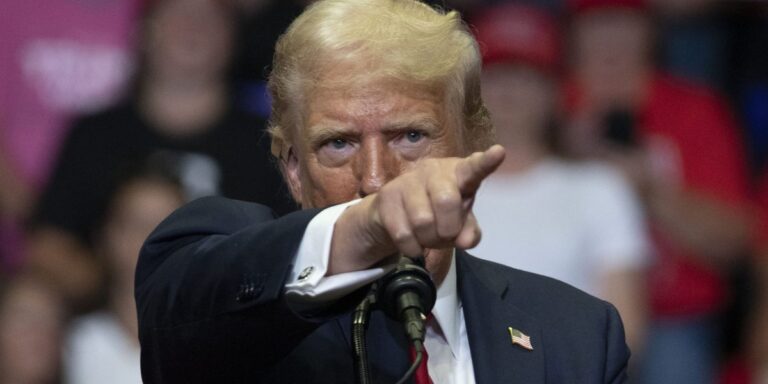
You’re here CEO Elon Musk is firmly on former President Donald Trump’s side politically, but what a potential Trump administration might mean for the electric vehicle maker that pays Musk billions is unclear, even to Musk himself.
During a call with financial analysts Tuesday, Wells Fargo Director Colin Langan asked Musk to explain the impact of a Trump victory and the potential annihilation of $7,500 federal tax credit for electric vehicles.
“I suspect there would be some impact,” Musk said. “It would be devastating to our competitors and it would be a small detriment to Tesla.”
The CEO also noted that because Trump has promised to impose heavy tariffs on vehicles produced in Mexico, Tesla would back away from investing in a factory it had planned to open. in Monterrey in 2026“If that’s the case, we’ll have to see how things play out politically,” he said. Yesterday, Musk reports refused that he would inject $45 million a month into Trump’s campaign.
Talk about CNBC prior to the earnings conference call, Dan Ives, technology analyst at Wedbush Securities said a Trump presidency could be negative for the overall electric vehicle market because Trump could eliminate the Inflation Reduction Act and with it the tax credits for electric vehicles and some plug-in hybrid vehicles. That would mean an administration led by Kamala Harris, the presumptive Democratic nominee, could be a boon for the electric vehicle industry.
Still, Trump might be better at pushing the regulatory agenda needed to advance fully self-driving and autonomy, which is a key part of Tesla’s growth strategy, Ives said.
“Musk has been a bit of a background noise under the Biden administration and under the Trump administration, is this something that will be more front and center?” Ives said. “That’s why I would say Tesla is part of this Trump deal.”
Elon Musk has dismissed the idea that regulators could object to a fleet of Tesla-made self-driving robotaxis that lack steering wheels and pedals. An analyst asked Musk to explain why regulatory risk is not an issue for Tesla, given that General Motors had suspended production of its Origin vehicle, which does not have a steering wheel, in favor of its Chevrolet Bolt, partly because of regulation. The Cruise Origin autonomous vehicle would need approval from the National Highway Traffic Safety Administration because it lacks traditional manual controls like a steering wheel and pedals, which are required by current safety regulations, and was written for cars with human drivers, not fully autonomous vehicles.
“The primary reason for switching from Origin to Bolt is that we are eliminating regulatory risk,” GM CEO Mary Barra said in a statement. Reuters report.
“The real reason they canceled this project is GM can’t make it work,” Musk said, adding that the automaker’s technology “is not up to par.” He said blaming regulators was “misleading.”
Jim Cain, GM’s chief executive, said Fortune Musk is completely wrong.
“All of these statements are categorically false,” said Cain, who listened to Musk’s comments during the earnings call. “The Origin vehicle had to overcome many hurdles to get certified because it doesn’t have a steering wheel, it doesn’t have a brake pedal, and it has a unique seating arrangement that requires a federal motor vehicle safety waiver — period.”
Cain says Cruise’s technology is getting better every day because of how it leverages its data set with AI. “And so far, they’ve driven over 5 million miles of fully autonomous driving, while Tesla has driven exactly zero.”
Musk has unwavering faith in Tesla’s power to “solve autonomy,” something he reiterated Tuesday, even as Tesla financial results reported Net profits fell 45%, marking its second quarter of slow growth and its fourth straight quarter of declining quarterly profits. Auto industry data also showed that Tesla continues to lose popularity in California, where Sales fell by 24% in the second quarter. Meanwhile, Trump promised to end what he called the “new green scam,” promising to abolish “the electric vehicle mandate from day one.”
According to Ives, if autonomy is Tesla’s strategic future, it might be more beneficial for Tesla to have less regulation, which is more likely under a Trump presidency than a Harris presidency.
“The cherry on top for investors is the impact the company will have on the robotics market and its efforts in fully self-driving and autonomy,” Ives said. Ultimately, that’s how the company could potentially reach a $1 trillion or even $2 trillion valuation, he added.


